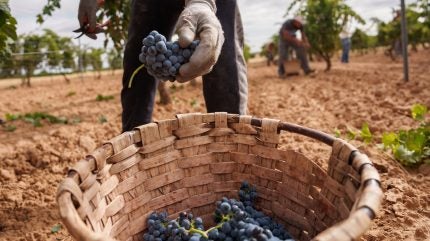
The EU should drive the permanent grubbing-up of vines to tackle the “structural over-supply” of wine in parts of the bloc, a report has recommended.
The removal of vines features among a series of suggestions put forward by the High-Level Group on Wine Policy this week.
In the EU, the wine sector is facing “significant” pressure on demand while climate change and more frequent “extreme weather events” are hitting production, the report said.
In 2023, some 107 million hectolitres of wine was consumed in the EU, according to the International Organisation Of Vine and Wine (OIV). That figure was more than 5% below its ten-year average.
In October, France’s government announced a new €120m ($124.7m) grub-up scheme it hopes will remove 30,000ha of vineyard across the country’s wine regions. Growers will be paid €4,000/ha ($4,225/ha) to uproot vineyards – and are not permitted to replant until at least 2030.
Data collected by farming unions in November forecast a near-3% fall in production across 24 EU member states in 2024.
The recommendations of the High-Level Group on Wine Policy focus on three areas – “aligning wine production with demand, boosting resilience to market and climate challenges and adapting to trends to seize new market opportunities”.
As well as the grubbing-up schemes, the report recommends “flexible” management systems for planting vines and replanting authorisations, as well as mechanisms to adjust grape yields.
To help wine growers become more resilient to climate risks, the report advises the EU to look at insurance schemes to help vintners in the face of extreme weather. Rules within the EU’s Common Agricultural Policy and on state aid should be adapted, it added.
Extreme weather events, including early frosts, heavy rainfall, and prolonged droughts, have significantly impacted global production, which is forecasted to hit its lowest point since 1961.
The High-Level Group on Wine Policy also emphasised the need to adapt to “changing consumer preferences and market conditions”.
It said the forthcoming revisions of the EU legal framework for wine should “explore all options” to adapt rules on definitions, oenological practices and packaging “to facilitate the marketing of grapevine products more attuned to new consumer demands”.
The group pointed to demand for “more accessible wines, and especially fully and partially dealcoholised wines, as well as non de-alcoholised, low-alcohol wines”.
The report, however, said the EU should at the same time seek to “preserve the integrity of the sector and prevent damages to the long-standing good reputation of EU wines”.



